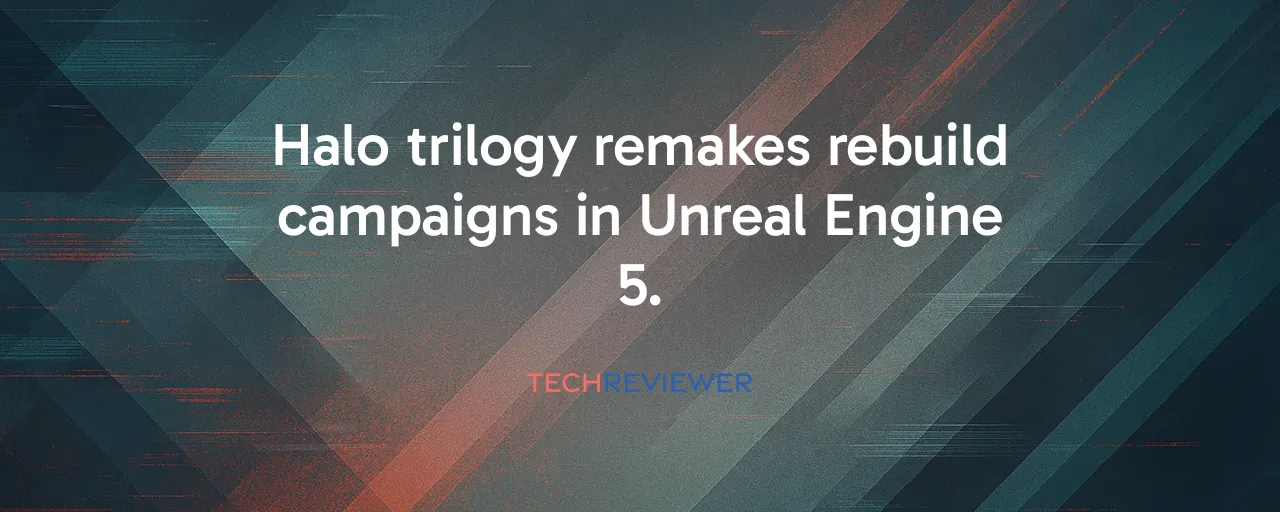Leak Points to Full Trilogy Overhaul
Social media posts from established Halo leakers claim that Halo Studios prepares complete remakes of Halo 2 and Halo 3 after Halo: Campaign Evolved arrives in 2026. The updates rebuild each game from the ground up on Unreal Engine 5. Sprint mechanics appear in both titles to match current shooter standards. Multiplayer stays absent, with all competitive play moving to Halo 7.
Halo: Campaign Evolved already confirmed the engine switch and cross-platform release on Xbox Series X|S, PC, and PlayStation 5. Leakers state the studio gauges interest through the first remake's sales before greenlighting the sequels. This sequential rollout stretches potential launches into the next decade.
Engine Shift Enables Modern Visuals
Unreal Engine 5 replaces the old Slipspace system used in Halo Infinite. Developers gain advanced lighting, detailed environments, and smoother animations. Hands-on reports from gaming outlets describe the Silent Cartographer level with sharper textures and dynamic shadows that surpass the 2011 Anniversary edition.
Gameplay blends new rendering with legacy Blam engine elements for consistent feel. Four-player online co-op works across platforms, and consoles support two-player split-screen. Voice actors return to record lines, preserving the original performances with updated delivery.
Sprint Divides Player Expectations
Adding sprint aligns movement with titles like Halo: Reach and beyond. Players navigate levels faster and evade threats more fluidly. Health packs vanish in favor of regenerating shields, shifting resource decisions during fights.
Some longtime fans argue the change alters pacing Bungie designed around fixed speeds. Jaime Griesemer, lead on the first game, noted movement tweaks always create trade-offs. Level redesigns address repetitive sections, such as shortening library sequences, to keep engagement high.
Multiplayer Consolidation Lessons
Halo 3 defined Xbox 360 multiplayer and drew millions into online console play. The 2011 Halo: Combat Evolved Anniversary kept campaign focus and sold well by updating graphics alone. Destiny later showed Bungie sustaining live service engagement through regular updates and esports events.
Halo Infinite spread resources across campaign and multiplayer, leading to content gaps. Ending the 2025 Halo Championship Series after four years signals full pivot to the next title. Halo 7 centralizes battle passes, cosmetics, and ranked play to maintain one active community.
PlayStation Expansion Opens Markets
Halo: Campaign Evolved marks the series' first PlayStation release in 24 years. Ghost of Tsushima's PC port sold over 800,000 copies in 20 days after years of exclusivity, proving demand for delayed platforms. Halo remakes target similar untapped audiences.
Cross-progression links Xbox Live, PlayStation Network, and Steam accounts. Co-op sessions mix players regardless of system. The strategy counters stagnation from Infinite's mixed reception and builds revenue during Halo 7 development.
Campaign Focus Risks and Rewards
Story-driven remakes appeal to narrative fans and new PlayStation owners exploring the trilogy. Co-op recreates couch and online traditions without competitive pressure. Sales of Final Fantasy VII Remake exceeded 7 million units by leaning into single-player depth.
Players tied to Halo 3 matchmaking worry about losing social hubs. Extended timelines to 2032 for Halo 3 test patience. Studio viability hinges on Halo: Campaign Evolved proving the model before committing further resources.
